牛津译林版 高一上册 Module 1 Unit3 Looking good, feeling good grammar 非限制性定语从句(108张ppt)
文档属性
| 名称 | 牛津译林版 高一上册 Module 1 Unit3 Looking good, feeling good grammar 非限制性定语从句(108张ppt) | 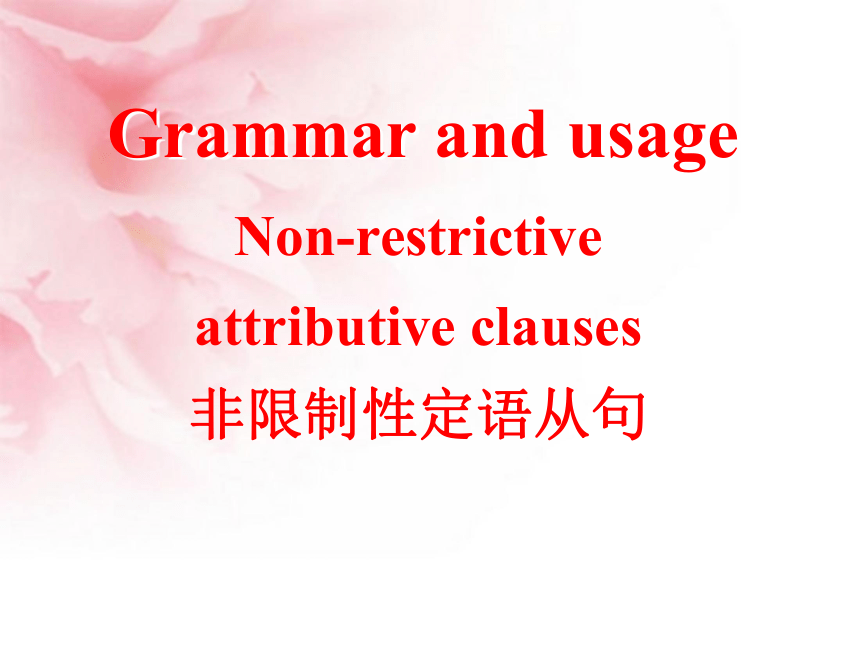 | |
| 格式 | zip | ||
| 文件大小 | 6.6MB | ||
| 资源类型 | 教案 | ||
| 版本资源 | 牛津译林版 | ||
| 科目 | 英语 | ||
| 更新时间 | 2018-04-08 19:43:36 | ||
图片预览

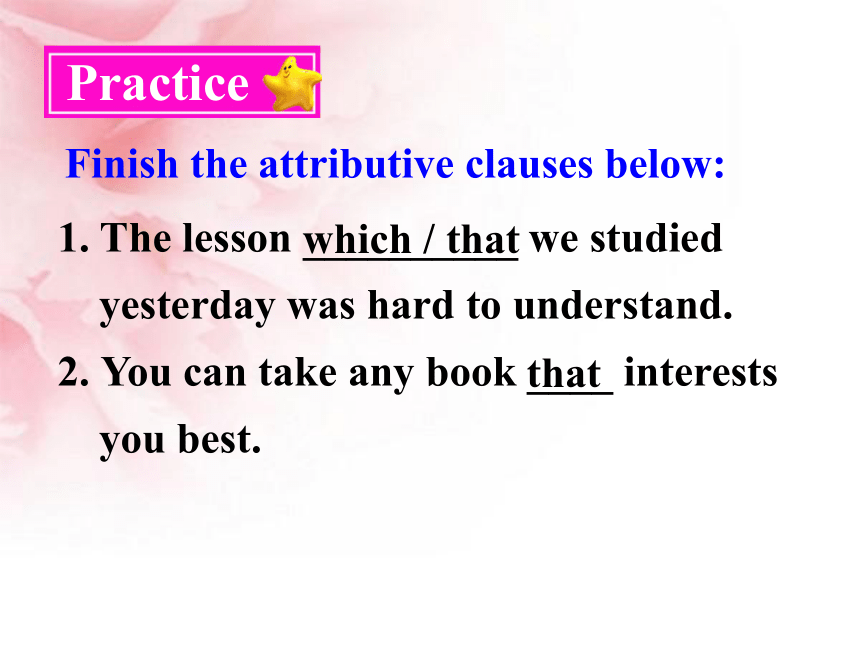


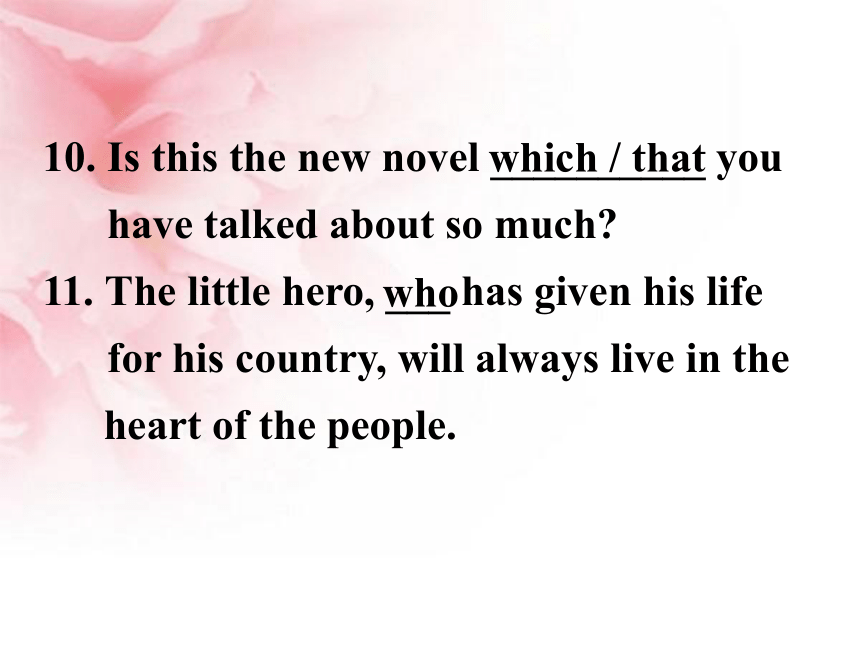
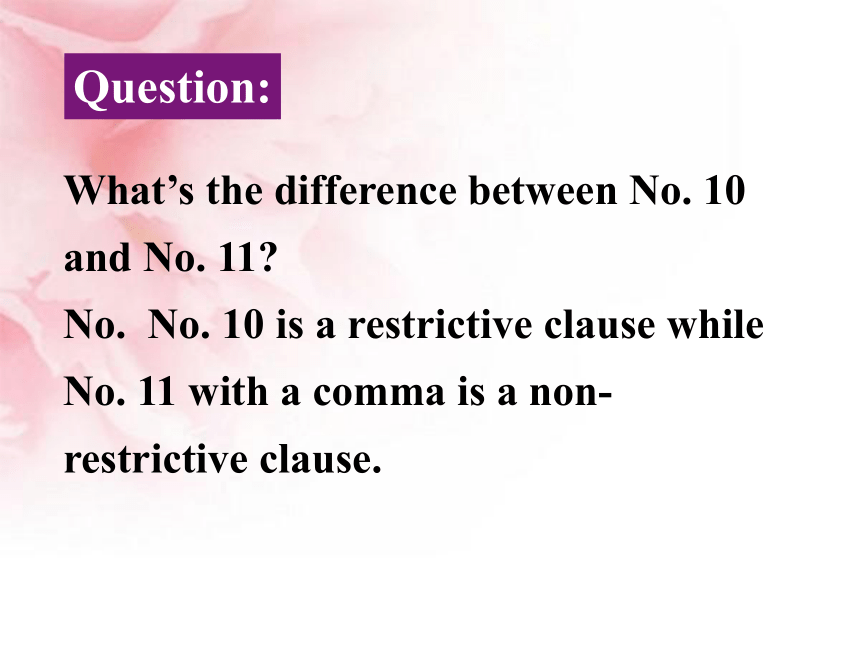
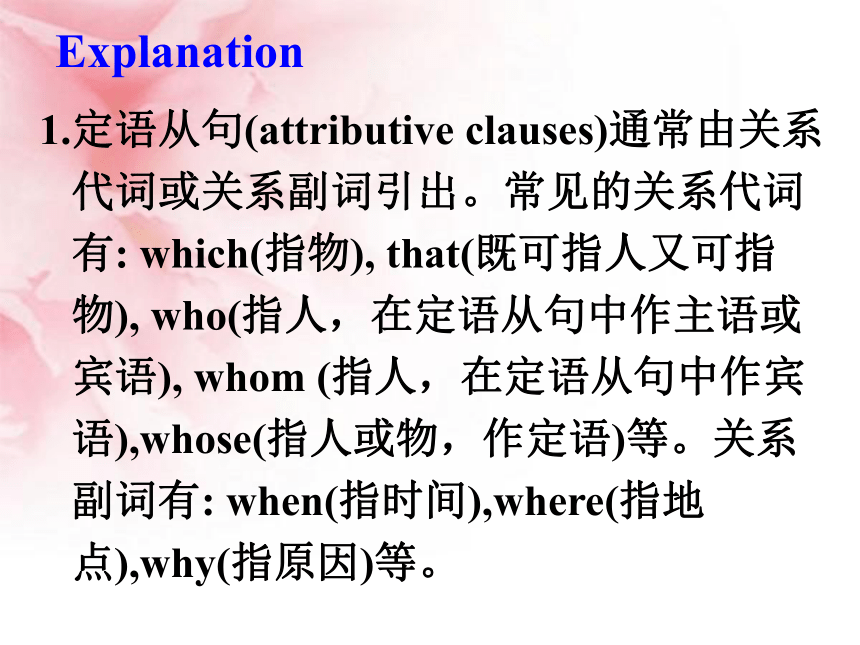



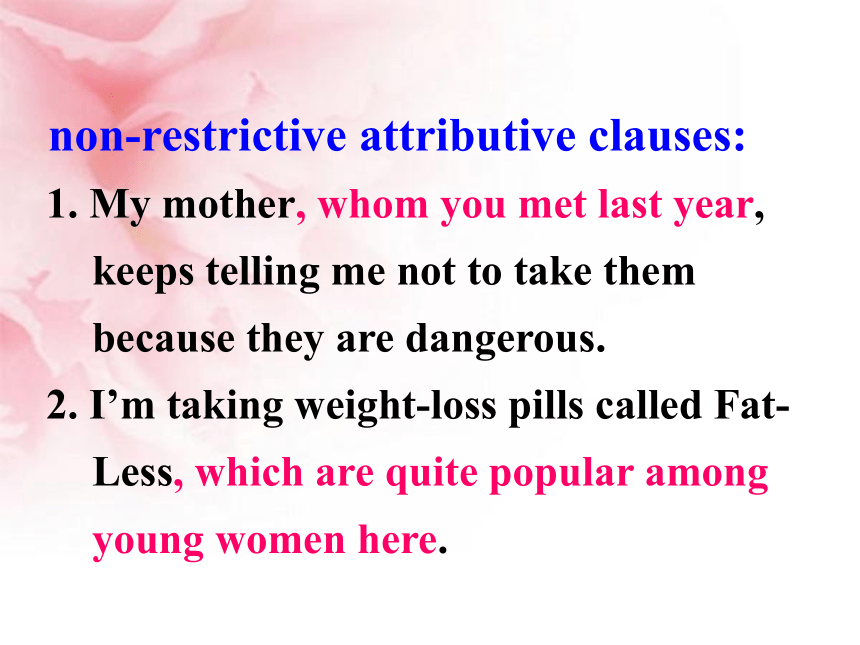
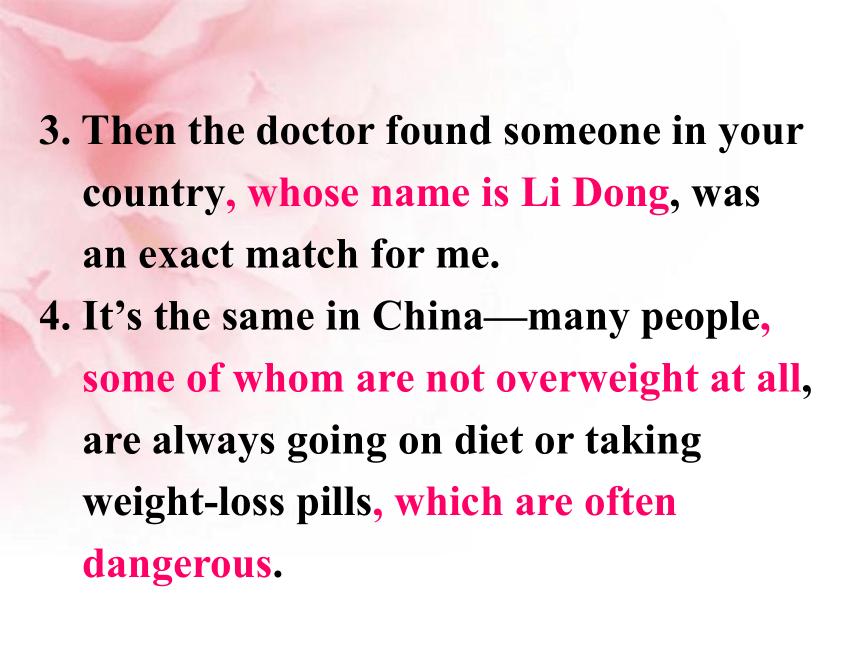
文档简介
课件108张PPT。Grammar and usageNon-restrictive attributive clauses
非限制性定语从句Finish the attributive clauses below:1. The?lesson?__________ we studied yesterday?was?hard?to?understand.
2.?You?can?take?any?book?____ interests you?best.thatwhich / that Practice?3.?People?like?to?live?in?a?place?_____ there’s fresh air and little noise.
4.?The?girl?__________ you saw at the meeting is?a?well-known swimmer.?
5.?He?is?the?very?worker?_____ picture we saw?in?the?newspaper?yesterday.?
6.?He?was?very?happy?on?the?day?______________ he entered?the?university.where?whom / thatwhoseon whichwhen / 7.?I?never?really?understand?the?reason? ____?he?made?such?a?serious mistake.
8.?Don’t?read?such?books?__?you?cannot
understand.?
9.?Is?that?the?student?_______ you?lent your dictionary??to?whomwhyas10.?Is?this?the?new?novel?__________?you?
have?talked about?so?much??
11.?The?little?hero,?___?has?given?his?life?
for his country, will?always live?in?the heart of the?people.whowhich / thatWhat’s the difference between No. 10 and No. 11?
No. No. 10 is a restrictive clause while No. 11 with a comma is a non-restrictive clause.Question:1.定语从句(attributive clauses)通常由关系代词或关系副词引出。常见的关系代词有: which(指物), that(既可指人又可指物), who(指人,在定语从句中作主语或宾语), whom (指人,在定语从句中作宾语),whose(指人或物,作定语)等。关系副词有: when(指时间),where(指地点),why(指原因)等。Explanation2. 定语从句分为限制性定语从句(restrictive )和非限制性定语从句(non-restrictive)两种。限制性定语从句紧跟先行词,与先行词之间一般不加逗号;非限制性定语从句与主句之间通常用逗号分开。
Try to find the attributive clauses in the Reading section on page 42-43 and tell their functions.restrictive attributive clauses:
1. They contain a harmful chemical that caused my liver to fail.Practice2. We shouldn’t be ashamed of the way we look, should we?
3. This is really a touching story—a stranger who donated part of his liver to a girl he doesn’t even know!1. My mother, whom you met last year, keeps telling me not to take them because they are dangerous.
2. I’m taking weight-loss pills called Fat-Less, which are quite popular among young women here.non-restrictive attributive clauses:3. Then the doctor found someone in your country, whose name is Li Dong, was an exact match for me.
4. It’s the same in China—many people, some of whom are not overweight at all, are always going on diet or taking weight-loss pills, which are often dangerous.Differences between the restrictive and non-restrictive attributive clauses.DiscussionLook at the following examples and tell the differences between the sentences.1. His father, who works in Beijing, came back yesterday.
2. Shanghai, which is in East China, is developing rapidly.Example 1Conclusion 1当先行词是地名、人名、世界上独一无二的事物或家庭唯一成员时,通常只用非限制性定语从句修饰。1. I have a sister who / that works in a hospital. 我有一位在医院工作的姐姐。
2. I have a sister, who works in a hospital.我有一位姐姐,她在医院工作。Example 2不只一位姐姐只有一位姐姐3. The magazines here which / that have nice pictures in them were written by him. 里面有漂亮图画的那些杂志是他写的。
4. The magazines here, which have nice pictures in them, were written by him. 所有的杂志都是他写的, 里面都有漂亮的图画。杂志有两类杂志只有一类Conclusion 21. 限制性定语从句与先行词关系密切,是先行词不可缺少的部分,如果去掉它,主句意思往往不明确。
2. 非限制性定语从句是对先行词的补充或说明,去掉它也不会影响主句的意思。This is the house (which/ that )we bought last month. 这是我们上个月买的那幢房子。
2. The house, which we bought last month, is very nice. 这房子很漂亮,是我们上个月买的。Example 3限制性定语从句非限制性定语从句3. He seems not to have grasped what I meant, which greatly upsets me. 他似乎没领会我的意思, 这使我心烦。非限制性定语从句Conclusion 31. 限制性定语从句可以由关系代词,关系副词来引导,关系代词作宾语时可以省略。
2. 非限制性定语从句既可修饰先行词,又可修饰整个主句,不可用that引导且关系代词不可以省略。1. The famous basketball star, ___ comes from America, will visit our school soon.
2. In those days, she used to go to Mr black,with _____ she had a wonderful time.
3. I bought a car yesterday, _____ cost me a lot.whichwhomwho Practice4. Xi’an, ______I visited last year, is a nice old city.
5. He will come to see me next July, _____ he won’t be so busy.
6. The school, _____ I once studied, was built thirty years ago.
whichwherewhen7. John said he’d been working in the office for an hour, _____ was true.
8. __ we all know, he is good at English.Aswhich非限制性定语从句考点归纳:as 和which引导非限制性定语从句, 代替整个主句。1. As everyone knows,China is a country
with a long history. 众所周知,中国是一个历史悠久的国家。Example:2. She is a teacher, as is clear from her manner. 她是个教师, 这一点从她的举止可以清楚地看出。
3. He missed the show, which was really a great pity. 他错过了演出,这真是很大的遗憾。4. He invited me to dinner, which made me very happy. 他请我吃饭,这使我很高兴。Conclusion1. as 和which在引导非限制性定语从句时, as和which可代替整个主句,相当于and this或and that。这两个关系代词都可指代主句所表达的整个意思,且在定语从句中都可以作主语和宾语。2. as和which引导非限制性定语从句的不
同之处在于:
(1) as 引导的定语从句可置于句首,而which引导的定语从句不可放在句首。
(2) as 代表前面的整个主句并在从句中作主语时,从句中的谓语必须是系动词;若从句中的谓语为行为动词,则从句中的关系代词只能用which。另外,as引导非限制性从句,常带有“正如”的意思。 PracticeAlice received an invitation from her boss, _____ came as a surprise.
2. The weather turned out to be very good, _____ was more than we could expect.
3. __ is expected, the England team won the football match.Aswhichwhich4. It rained hard yesterday, _____ prevented me from going to the park.
5. __ we can see, the smoke came from the little dustbin. whichAsII. all /some of + whom / which引导非限制性定语从句Example:He has told us many stories, all of which are about the famous Long Match.
2. The students of Class 1, some of whom came from Japan, went camping yesterday.Conclusion 在非限制性定语从句中,一些表达数量或定位的数词或代词如 all/ some/ one/ both/ neither/ none/ any/ either/ any 等可与 of 构成介词词组修饰限制先行词,此时先行词在其后的定语从句中作介词的宾语,关系代词不可用that。如先行词指人则用whom,如先行词指物则用which引导从句。1. Many students in this school, some of which are not overweight, are going on diets.
2. There are 54 students in my class and ten of whom come from US.whomCorrection:them3. Half a million pairs of shoes are produced by the workers here every year, 80% of whom are sold abroad.
4. I have many friends in this town, some of which are businessman.
5. I am doing different types of exercises, all of them are quite helpful to my health.whichwhich 或 all 前加andwhomPractice timeHelen was much kinder to her youngest son than to the others, ____, of course, made the others envy him.
A. who B. that C. what D. which2. The English play, ____ my students acted at the New Year’s party ,was a great success. A. for which B. at which C. in which D. on which3. There were dirty marks on her trousers ____ she had wiped her hands. A. where B. which C. when D. that
4. Great changes have taken place in that school. It is no longer what it was 20 years ago, ____ it was so poorly equipped.
A. when B. which C. what D. that5. The British are not so familiar with different cultures and other ways of doing things, _____is often the case in other countries.. A. it B. that C. as D .so6. Recently I bought an ancient Chinese vase, ____was very reasonable. A. which price B. the price of which C. its price D. the price of whose7. Mr. Smith will move into his new house next Sunday, ___ it will be completely finished. A. by the time B. on that time C. on which D. by which time
8. Have you seen the film “Titanic”, ___ leading actor is world-famous?
A .its B .it’s C. whose D. which9. ─ Is there a department store around
___ I can get a birthday present for
my daughter? ─ Yes, just across the street. A. here B which C. where D. it
10. Jiuzhaigou Valley is a most famous
place of interest,____ I will never
forget in my life. A. it B. that C. one D. what1. ① This is one of the most interesting films ___ shown last week.
② This is the very one of the most interesting films ___ shown last week.
A. which was B. that was
C. which were D. that wereBDComparison2. ① He has two sons, __ are college students.
② He has two sons, and __ are college
students. A. both of which B. both of whom C. both of them D. both of itCB 3.① He still lives in the room __ window faces to the east.
② He still lives in the room, the window __ faces to the east.
③ He still lives in the room __ is in the north of the city.
④ He still lives in the room __ there is a beautiful table. A. which B. whose C. where D. of whichCADB4. ① ___ we all know, China is rich in
natural resources.
② ___ is well-known that China is rich in natural resources.
③ ___ is well-known, China is rich in natural resources.
A. Which B. As C. It D. ThatBCB5.① Is this museum ___ he visited last month?
② The teacher tells us that ___ cleans the blackboard is to be praised. A. that B. the one C. which D. the one whoBD 1. Go over the restrictive and non-restrictive attributive clauses.
2. Finish the exercises of Part A and B on p48-49 in your textbook.
3. Finish Part C1 on P96 in your workbook.Homework Question tagsDo you often say “I love you” to your parents? How do you say that?Sometimes you may ask them:You love me, don’t you?1. What are question tags?Question tags are short questions that come at the end of statements. Discussion2. Look at the following examples and tell in what different situations the question tags are used. Example 1: It’s a lovely day, isn’t it?
Situation 1: to start a conversation
Example 2: Neither of you has heard the news, have you?
Situation 2: to request information in a more polite way.Example 3: Pass the knife on the table to me, will you?
Situation 3: to soften an order or a request for someone to do something.Situation 4:
1. to ask for agreement, using a falling tone.
(The speaker is sure about what is said.)
2. to ask for confirmation, using a rising tone.
(The speaker is not sure about what is said.)Example 4:
1. You’re a high school student, aren’t you?
2. You’re a high school student, aren’t you?Try to find the question tags in the Reading section on page 42-43 and tell the situations and tones.Practice:1. Looking good is important to women, isn’t it?
I was lucky, wasn’t I?
We shouldn’t be ashamed of the way we look, should we?ExamplesAll the question tags above are used to ask for agreement by the writer and they should be read in a falling tone.Conclusion:DiscussionPair work 1. What are the two kinds of question tags?
Positive question tags and negative question tags.
2. How are question tags formed?
Usually a negative question tag is used at the end of a positive statement; a positive question tag is used at the end of a negative statement.Rules:
陈述部分带有seldom, hardly, never, neither, none, nobody, nothing, few, little 等否定词时,疑问部分应用肯定。
如果陈述部分的否定词仅带否定前缀或后缀,那么,陈述部分做肯定句处理,疑问部分仍用否定形式。e.g. He was unsuccessful, _________?
当陈述部分是以there开头时,疑问 部分主语也用there。
e.g. There is no help for it,________?
There is something wrong, _________?wasn’t heis thereisn’t there4. 如果陈述部分是I am 的结构,疑问部分用aren’t I.
e.g. I am late, ________?
5. 如果陈述部分是一个带有that分句作宾语的主从结构时,疑问部分一般应与主句的主语和谓语动词保持对应关系。aren’t Ie.g. She says that I did it,__________?
注意:当陈述部分的主句是I suppose, I think, I believe 等结构时,疑问部分则往往与that分句中的主语和谓语动词保持对应关系,但要注意否定的转移。
e.g. I supposed that he is serious, ______?
I don’t think that she works hard, ________?doesn’t sheisn’t hedoes she6. 陈述部分含有ought to时,疑问部分可以用ought形式,也可用should形式。
e.g. The child ought to be punished, __________?
We ought to go there, ___________?
7. 陈述部分有used to时,疑问部分可用used形式,也可用did形式。
e.g. He used to smoke five cigarettes a day, ________________?oughtn’t heshouldn’t wedidn’t / usedn’t he8. 陈述部分有had better,would rather,would like时,疑问部分要注意区别简略形式。
e.g. You’d better go now,__________?
You’d rather go there early, ____________?
He’d like to go,_____________?hadn’t youwouldn’t hewouldn’t you 9. 陈述句中must后动词的类属与时态不同,反意疑问句也不同。
1). must表“必须”“必要”时,疑问部分用mustn’t或needn’t。
e.g. You must work hard next term,___________?
You must go home right now,____________?mustn’t youneedn’t you2). mustn’t 表“禁止”,疑问部分用must。
e.g. You mustn’t walk on grass, _________?
3). must 表推测时,疑问部分不用must,而要把陈述部分改写。如:
e.g. He must be very tired,________?
(=I’m sure he is very tired.)must youisn’t heHe must have waited for a long time, _________?
(=I’m sure he has waited for a long time.)
You must have seen the play last week,__________?
(=I’m sure you saw the play last week.)hasn’t hedidn’t you10. 陈述部分中有have时
1). Have意为“有”时,可以有两种形式。
e.g. He doesn’t have any sisters,_______?
He hasn’t any sisters,______?
You have a Rolls-Royce,_________________?has hedoes hehaven’t /don’t you2). Have 意为“吃,经历,遭受,得到”等其它含义时,疑问部分只用do的适当形式。
e.g. You all had a good time,__________?
He often has colds,__________?
3). 当含有have to,had to时,疑问部分 用do的适当形式。
e.g. They had to take the early train, _________?didn’t youdoesn’t hedidn’t they11. 当陈述部分主语为this,that,everything,anything,something,nothing等时,反意疑问句的主语用it。
e.g. Everything is all right,________?
Nothing can stop us now,________?isn’t itcan it12. 当陈述部分中主语为anybody, anyone, everybody, everyone, somebody, someone, nobody, no one, those, these反意疑问句中主语用they。
e.g. Everyone knows the answer, __________?don’t they13. 在祈使句中
1). 肯定与否定的祈使句中,疑问部分都用will you
e.g. Don’t move the chair,________?
2). 以let’s开头的祈使句,疑问句部分用shall we
3). 以let us开头的祈使句,疑问句部分用will youwill you14. 感叹句的反意疑问句一律用否定式,疑问部分人称代词与陈述部分一致。
e.g. What a lovely day,________?
15. 陈述句的主语是不定式,动名词或词组时,反意疑问句的主语应为it。
e.g. Doing morning exercises has helped to improve her health,_________?isn’t ithasn’t it(想喝)-Yes, we will.(不想喝)-No, we won’t.(他能)(他不能)-Yes, he can.-No, he can’t.16. 反意疑问句的回答方式与一般疑问句一样,肯定回答用yes,否定回答用no。
e.g. –Neither of us will have coffee, will you? -His father can’t name the plant, can he?1. ─Why does she always ask you for help? ─There is no one else she can turn to,__? A. is there B. is it C. can she D. does she
2. There was a loud scream from the backstage immediately after the concert ended, _____? A. wasn’t there B. was there C. didn’t it D. did itPractice3. There is no light in the dormitory. They must have gone to the lecture, __? A. didn’t they B. don’t they C. mustn’t they D. haven’t they
4. Bill’s aim is to inform the viewers that cigarette advertising on TV is illegal, ______? A. isn’t it B. is it C. isn’t he D. is he高考链接
1. I’m taking some weight-loss pills, which are quite popular here. (P48)
[考点] 非限制性定语从句是对主句中的先行词作补充说明,通常用逗号将它和主句分开。[考例] Chan’s restaurant on Baker Street, _______ used to be poorly run, is now a successful business. (浙江 2007)
A. that B. which C. who D. where
[点拨] 先行词Chan’s restaurant在非限制性定语从句中作主语,故用which。非限制性定语从句中不能用that。2. He missed the show, which was a great pity. (P48)
[考点] 非限制性定语从句中的关系代词which可以描述前面整个主句的内容。
[考例] His movie won several awards at the film festival, ______ was beyond his wildest dream. (上海 2007)
A. which B. that C. where D. it
[点拨] which引导非限制性定语从句,指代整个主句的内容。3. I am doing different types of exercises, all of which are quite helpful to my health.(P48)
[考点] 在定语从句中,表达全部或部分的物时用all / some / two / both, etc. + of + which,通常用于非限制性定语从句中。[考例] It is reported that two schools, ______ are being built in my hometown,will open next year.(四川 2007)
A. they both B. which both
C. both of them D. both of which
[点拨] 本题考查非限制性定语从句用法,先行词为two schools,因此用关系代词which。4. Many people, some of whom are not overweight, are going on diets. (P48)
[考点] 在定语从句中,表达全部或部分的人时用all / some / two / both, etc. + of + whom,通常用于非限制性定语从句中。[考例] We shouldn’t spend our money testing so many people, most of _______ are healthy. (北京 2007)
A. that B. which C. what D. whom
[点拨] 本题考查非限制性定语从句用法,先行词为people, 因此用关系代词whom.5. Post a letter for me, will you? (P50)
[考点] 祈使句后附加问句,不表示反意,而表示一种语气。其结构为:否定祈使句, will you?;肯定祈使句, will / won’t you?; Let’s ..., shall we?; Let us ..., will you?; Let + 第三人称 ..., will you?。[考例1] We forgot to bring our tickets, but please let us enter, _______? (2006 全国卷II)
A. do you B. can we
C. will you D. shall we
[点拨] 此题考查Let us开头的祈使句的反意疑问句。Let us ... 表示请求,反意疑问用will you或者won’t you; Let’s ... 表示建议,反意疑问用shall we。[考例2] When you’ve finished with that book, don’t forget to put it back on the shelf, _______? (北京 2007)
A. do you B. don’t you
C. will you D. won’t you
[点拨] 否定祈使句后的反意疑问句用will you。Language points1. considerNow he is considering taking some pills,
which he thinks will make him become
stronger. ( Page 49, line 7 )释义:
a. think about 考虑, 思考 b. be of the opinion, regard as 认为,以为c. take into account 顾虑, 体谅
consider
(doing )
sth
consider的常见用法我们已经考虑了今天下午去科技馆。 We have ____________________ ______________this afternoon.
2. 我认为你不该为之受责备。 I consider _____________________ _____. considered going to the science museum that you are not to blame
for it完成下列句子的英文翻译:3. 他们认为你很热心。 They consider _______________ _______.
4. 我们认为这件事不重要。 We consider _____________ ___________. this matter (as) unimportant
you to be warm-hearted5. 这个科学家被认为发明了一种新型电话。 This scientist___________________ ____________________________.
6. 我们认为他这样做是自私的。 We consider _____________________. is considered to have invented a new type of telephone it selfish for him to do soaffect
effect
effort
offerresult, impression
hold out, put forward
trying hard
have an influence on2. affect / effect / effort / offer
1. All the people there were _______ to tears.
2. Kate was much _______ by the sad news.
3. The book had a great _____on his future. affectedaffectedeffectaffect / effect / effort / offerPractice4. He used to ____ me black bread for lunch.
5. Jim will make more _____ to learn English well.offerefforts3. recognize / realize释义:know, identify again; 认识,认出 be willing to accept ... as in the past; 承认,认可
be prepared to admit;自认,知道
acknowledge; 公认,赏识
常见用法: recognize sb/ sth.
recognize…as/ to be…
recognize that…recognize释义: be fully conscious of, understand 完全认识, 了解
convert …into a fact 使(计划、希望等)实现
exchange…for money 变卖(财产、股票等)
obtain as a price or profit 卖得、获得
常见用法: realize sb. / sth.
realize that… realize recognize / realize1. Has he _______ his mistake yet?
2. Dogs ________ people by their smell.
4. I don’t think you fully ______ the importance of his talk.
5. She looked at the letter and _________ my handwriting.recognizerealizedPracticerealizerecognizedFill in the blanks, using the correct forms of the following words.
lift, achievement, risk, post, put on, fall out1. He _____ his hat and went outside.
2. ____ your head up and pay attention.
3. Jim went back home after he had _______ his goal. achievedLiftput on4. Do you mind ______ a letter to me?
5. Don’t ___ going on thin ice!
6. Her hair has ________ after taking this kind of medicine.fallen outriskposting I have a good friend,(1) ___ is really thin.Twice a week he goes to the gym, (2) _____ he exercises and lifts weights.But the fact is he’s still quite thin, (3) ______ makes him unhappy. Now he is thinkingwhowherewhichComplete the following passages with who, whose, which, where, or whenabout taking some pills, (4) _____ he thinks will make him become stronger. Does anyone know if it’s safe to take these pills?
There are some pills to make you look strong. However, they have side effects, (5) _____ will do harm to your health. After taking this kind of pill for somewhichwhichtime, your friend’s hair might fall out or he might have health problems, some of(6) _____ may even do harm to his liver or heart. Many sportsmen, (7) _____ achievements were great, died very young because they took these kinds of pills. I don’t think your friend shouldwhichwhosetake the risk. Tell your friend not to take the pills because he may have health problems in the future, (8) _____ it is too late. when1. Go over the question tags.
2. Finish Part A and B on P51 in your textbook as well as Part C2 on P96 in your workbook.
3. Preview Task.HomeworkThank you
非限制性定语从句Finish the attributive clauses below:1. The?lesson?__________ we studied yesterday?was?hard?to?understand.
2.?You?can?take?any?book?____ interests you?best.thatwhich / that Practice?3.?People?like?to?live?in?a?place?_____ there’s fresh air and little noise.
4.?The?girl?__________ you saw at the meeting is?a?well-known swimmer.?
5.?He?is?the?very?worker?_____ picture we saw?in?the?newspaper?yesterday.?
6.?He?was?very?happy?on?the?day?______________ he entered?the?university.where?whom / thatwhoseon whichwhen / 7.?I?never?really?understand?the?reason? ____?he?made?such?a?serious mistake.
8.?Don’t?read?such?books?__?you?cannot
understand.?
9.?Is?that?the?student?_______ you?lent your dictionary??to?whomwhyas10.?Is?this?the?new?novel?__________?you?
have?talked about?so?much??
11.?The?little?hero,?___?has?given?his?life?
for his country, will?always live?in?the heart of the?people.whowhich / thatWhat’s the difference between No. 10 and No. 11?
No. No. 10 is a restrictive clause while No. 11 with a comma is a non-restrictive clause.Question:1.定语从句(attributive clauses)通常由关系代词或关系副词引出。常见的关系代词有: which(指物), that(既可指人又可指物), who(指人,在定语从句中作主语或宾语), whom (指人,在定语从句中作宾语),whose(指人或物,作定语)等。关系副词有: when(指时间),where(指地点),why(指原因)等。Explanation2. 定语从句分为限制性定语从句(restrictive )和非限制性定语从句(non-restrictive)两种。限制性定语从句紧跟先行词,与先行词之间一般不加逗号;非限制性定语从句与主句之间通常用逗号分开。
Try to find the attributive clauses in the Reading section on page 42-43 and tell their functions.restrictive attributive clauses:
1. They contain a harmful chemical that caused my liver to fail.Practice2. We shouldn’t be ashamed of the way we look, should we?
3. This is really a touching story—a stranger who donated part of his liver to a girl he doesn’t even know!1. My mother, whom you met last year, keeps telling me not to take them because they are dangerous.
2. I’m taking weight-loss pills called Fat-Less, which are quite popular among young women here.non-restrictive attributive clauses:3. Then the doctor found someone in your country, whose name is Li Dong, was an exact match for me.
4. It’s the same in China—many people, some of whom are not overweight at all, are always going on diet or taking weight-loss pills, which are often dangerous.Differences between the restrictive and non-restrictive attributive clauses.DiscussionLook at the following examples and tell the differences between the sentences.1. His father, who works in Beijing, came back yesterday.
2. Shanghai, which is in East China, is developing rapidly.Example 1Conclusion 1当先行词是地名、人名、世界上独一无二的事物或家庭唯一成员时,通常只用非限制性定语从句修饰。1. I have a sister who / that works in a hospital. 我有一位在医院工作的姐姐。
2. I have a sister, who works in a hospital.我有一位姐姐,她在医院工作。Example 2不只一位姐姐只有一位姐姐3. The magazines here which / that have nice pictures in them were written by him. 里面有漂亮图画的那些杂志是他写的。
4. The magazines here, which have nice pictures in them, were written by him. 所有的杂志都是他写的, 里面都有漂亮的图画。杂志有两类杂志只有一类Conclusion 21. 限制性定语从句与先行词关系密切,是先行词不可缺少的部分,如果去掉它,主句意思往往不明确。
2. 非限制性定语从句是对先行词的补充或说明,去掉它也不会影响主句的意思。This is the house (which/ that )we bought last month. 这是我们上个月买的那幢房子。
2. The house, which we bought last month, is very nice. 这房子很漂亮,是我们上个月买的。Example 3限制性定语从句非限制性定语从句3. He seems not to have grasped what I meant, which greatly upsets me. 他似乎没领会我的意思, 这使我心烦。非限制性定语从句Conclusion 31. 限制性定语从句可以由关系代词,关系副词来引导,关系代词作宾语时可以省略。
2. 非限制性定语从句既可修饰先行词,又可修饰整个主句,不可用that引导且关系代词不可以省略。1. The famous basketball star, ___ comes from America, will visit our school soon.
2. In those days, she used to go to Mr black,with _____ she had a wonderful time.
3. I bought a car yesterday, _____ cost me a lot.whichwhomwho Practice4. Xi’an, ______I visited last year, is a nice old city.
5. He will come to see me next July, _____ he won’t be so busy.
6. The school, _____ I once studied, was built thirty years ago.
whichwherewhen7. John said he’d been working in the office for an hour, _____ was true.
8. __ we all know, he is good at English.Aswhich非限制性定语从句考点归纳:as 和which引导非限制性定语从句, 代替整个主句。1. As everyone knows,China is a country
with a long history. 众所周知,中国是一个历史悠久的国家。Example:2. She is a teacher, as is clear from her manner. 她是个教师, 这一点从她的举止可以清楚地看出。
3. He missed the show, which was really a great pity. 他错过了演出,这真是很大的遗憾。4. He invited me to dinner, which made me very happy. 他请我吃饭,这使我很高兴。Conclusion1. as 和which在引导非限制性定语从句时, as和which可代替整个主句,相当于and this或and that。这两个关系代词都可指代主句所表达的整个意思,且在定语从句中都可以作主语和宾语。2. as和which引导非限制性定语从句的不
同之处在于:
(1) as 引导的定语从句可置于句首,而which引导的定语从句不可放在句首。
(2) as 代表前面的整个主句并在从句中作主语时,从句中的谓语必须是系动词;若从句中的谓语为行为动词,则从句中的关系代词只能用which。另外,as引导非限制性从句,常带有“正如”的意思。 PracticeAlice received an invitation from her boss, _____ came as a surprise.
2. The weather turned out to be very good, _____ was more than we could expect.
3. __ is expected, the England team won the football match.Aswhichwhich4. It rained hard yesterday, _____ prevented me from going to the park.
5. __ we can see, the smoke came from the little dustbin. whichAsII. all /some of + whom / which引导非限制性定语从句Example:He has told us many stories, all of which are about the famous Long Match.
2. The students of Class 1, some of whom came from Japan, went camping yesterday.Conclusion 在非限制性定语从句中,一些表达数量或定位的数词或代词如 all/ some/ one/ both/ neither/ none/ any/ either/ any 等可与 of 构成介词词组修饰限制先行词,此时先行词在其后的定语从句中作介词的宾语,关系代词不可用that。如先行词指人则用whom,如先行词指物则用which引导从句。1. Many students in this school, some of which are not overweight, are going on diets.
2. There are 54 students in my class and ten of whom come from US.whomCorrection:them3. Half a million pairs of shoes are produced by the workers here every year, 80% of whom are sold abroad.
4. I have many friends in this town, some of which are businessman.
5. I am doing different types of exercises, all of them are quite helpful to my health.whichwhich 或 all 前加andwhomPractice timeHelen was much kinder to her youngest son than to the others, ____, of course, made the others envy him.
A. who B. that C. what D. which2. The English play, ____ my students acted at the New Year’s party ,was a great success. A. for which B. at which C. in which D. on which3. There were dirty marks on her trousers ____ she had wiped her hands. A. where B. which C. when D. that
4. Great changes have taken place in that school. It is no longer what it was 20 years ago, ____ it was so poorly equipped.
A. when B. which C. what D. that5. The British are not so familiar with different cultures and other ways of doing things, _____is often the case in other countries.. A. it B. that C. as D .so6. Recently I bought an ancient Chinese vase, ____was very reasonable. A. which price B. the price of which C. its price D. the price of whose7. Mr. Smith will move into his new house next Sunday, ___ it will be completely finished. A. by the time B. on that time C. on which D. by which time
8. Have you seen the film “Titanic”, ___ leading actor is world-famous?
A .its B .it’s C. whose D. which9. ─ Is there a department store around
___ I can get a birthday present for
my daughter? ─ Yes, just across the street. A. here B which C. where D. it
10. Jiuzhaigou Valley is a most famous
place of interest,____ I will never
forget in my life. A. it B. that C. one D. what1. ① This is one of the most interesting films ___ shown last week.
② This is the very one of the most interesting films ___ shown last week.
A. which was B. that was
C. which were D. that wereBDComparison2. ① He has two sons, __ are college students.
② He has two sons, and __ are college
students. A. both of which B. both of whom C. both of them D. both of itCB 3.① He still lives in the room __ window faces to the east.
② He still lives in the room, the window __ faces to the east.
③ He still lives in the room __ is in the north of the city.
④ He still lives in the room __ there is a beautiful table. A. which B. whose C. where D. of whichCADB4. ① ___ we all know, China is rich in
natural resources.
② ___ is well-known that China is rich in natural resources.
③ ___ is well-known, China is rich in natural resources.
A. Which B. As C. It D. ThatBCB5.① Is this museum ___ he visited last month?
② The teacher tells us that ___ cleans the blackboard is to be praised. A. that B. the one C. which D. the one whoBD 1. Go over the restrictive and non-restrictive attributive clauses.
2. Finish the exercises of Part A and B on p48-49 in your textbook.
3. Finish Part C1 on P96 in your workbook.Homework Question tagsDo you often say “I love you” to your parents? How do you say that?Sometimes you may ask them:You love me, don’t you?1. What are question tags?Question tags are short questions that come at the end of statements. Discussion2. Look at the following examples and tell in what different situations the question tags are used. Example 1: It’s a lovely day, isn’t it?
Situation 1: to start a conversation
Example 2: Neither of you has heard the news, have you?
Situation 2: to request information in a more polite way.Example 3: Pass the knife on the table to me, will you?
Situation 3: to soften an order or a request for someone to do something.Situation 4:
1. to ask for agreement, using a falling tone.
(The speaker is sure about what is said.)
2. to ask for confirmation, using a rising tone.
(The speaker is not sure about what is said.)Example 4:
1. You’re a high school student, aren’t you?
2. You’re a high school student, aren’t you?Try to find the question tags in the Reading section on page 42-43 and tell the situations and tones.Practice:1. Looking good is important to women, isn’t it?
I was lucky, wasn’t I?
We shouldn’t be ashamed of the way we look, should we?ExamplesAll the question tags above are used to ask for agreement by the writer and they should be read in a falling tone.Conclusion:DiscussionPair work 1. What are the two kinds of question tags?
Positive question tags and negative question tags.
2. How are question tags formed?
Usually a negative question tag is used at the end of a positive statement; a positive question tag is used at the end of a negative statement.Rules:
陈述部分带有seldom, hardly, never, neither, none, nobody, nothing, few, little 等否定词时,疑问部分应用肯定。
如果陈述部分的否定词仅带否定前缀或后缀,那么,陈述部分做肯定句处理,疑问部分仍用否定形式。e.g. He was unsuccessful, _________?
当陈述部分是以there开头时,疑问 部分主语也用there。
e.g. There is no help for it,________?
There is something wrong, _________?wasn’t heis thereisn’t there4. 如果陈述部分是I am 的结构,疑问部分用aren’t I.
e.g. I am late, ________?
5. 如果陈述部分是一个带有that分句作宾语的主从结构时,疑问部分一般应与主句的主语和谓语动词保持对应关系。aren’t Ie.g. She says that I did it,__________?
注意:当陈述部分的主句是I suppose, I think, I believe 等结构时,疑问部分则往往与that分句中的主语和谓语动词保持对应关系,但要注意否定的转移。
e.g. I supposed that he is serious, ______?
I don’t think that she works hard, ________?doesn’t sheisn’t hedoes she6. 陈述部分含有ought to时,疑问部分可以用ought形式,也可用should形式。
e.g. The child ought to be punished, __________?
We ought to go there, ___________?
7. 陈述部分有used to时,疑问部分可用used形式,也可用did形式。
e.g. He used to smoke five cigarettes a day, ________________?oughtn’t heshouldn’t wedidn’t / usedn’t he8. 陈述部分有had better,would rather,would like时,疑问部分要注意区别简略形式。
e.g. You’d better go now,__________?
You’d rather go there early, ____________?
He’d like to go,_____________?hadn’t youwouldn’t hewouldn’t you 9. 陈述句中must后动词的类属与时态不同,反意疑问句也不同。
1). must表“必须”“必要”时,疑问部分用mustn’t或needn’t。
e.g. You must work hard next term,___________?
You must go home right now,____________?mustn’t youneedn’t you2). mustn’t 表“禁止”,疑问部分用must。
e.g. You mustn’t walk on grass, _________?
3). must 表推测时,疑问部分不用must,而要把陈述部分改写。如:
e.g. He must be very tired,________?
(=I’m sure he is very tired.)must youisn’t heHe must have waited for a long time, _________?
(=I’m sure he has waited for a long time.)
You must have seen the play last week,__________?
(=I’m sure you saw the play last week.)hasn’t hedidn’t you10. 陈述部分中有have时
1). Have意为“有”时,可以有两种形式。
e.g. He doesn’t have any sisters,_______?
He hasn’t any sisters,______?
You have a Rolls-Royce,_________________?has hedoes hehaven’t /don’t you2). Have 意为“吃,经历,遭受,得到”等其它含义时,疑问部分只用do的适当形式。
e.g. You all had a good time,__________?
He often has colds,__________?
3). 当含有have to,had to时,疑问部分 用do的适当形式。
e.g. They had to take the early train, _________?didn’t youdoesn’t hedidn’t they11. 当陈述部分主语为this,that,everything,anything,something,nothing等时,反意疑问句的主语用it。
e.g. Everything is all right,________?
Nothing can stop us now,________?isn’t itcan it12. 当陈述部分中主语为anybody, anyone, everybody, everyone, somebody, someone, nobody, no one, those, these反意疑问句中主语用they。
e.g. Everyone knows the answer, __________?don’t they13. 在祈使句中
1). 肯定与否定的祈使句中,疑问部分都用will you
e.g. Don’t move the chair,________?
2). 以let’s开头的祈使句,疑问句部分用shall we
3). 以let us开头的祈使句,疑问句部分用will youwill you14. 感叹句的反意疑问句一律用否定式,疑问部分人称代词与陈述部分一致。
e.g. What a lovely day,________?
15. 陈述句的主语是不定式,动名词或词组时,反意疑问句的主语应为it。
e.g. Doing morning exercises has helped to improve her health,_________?isn’t ithasn’t it(想喝)-Yes, we will.(不想喝)-No, we won’t.(他能)(他不能)-Yes, he can.-No, he can’t.16. 反意疑问句的回答方式与一般疑问句一样,肯定回答用yes,否定回答用no。
e.g. –Neither of us will have coffee, will you? -His father can’t name the plant, can he?1. ─Why does she always ask you for help? ─There is no one else she can turn to,__? A. is there B. is it C. can she D. does she
2. There was a loud scream from the backstage immediately after the concert ended, _____? A. wasn’t there B. was there C. didn’t it D. did itPractice3. There is no light in the dormitory. They must have gone to the lecture, __? A. didn’t they B. don’t they C. mustn’t they D. haven’t they
4. Bill’s aim is to inform the viewers that cigarette advertising on TV is illegal, ______? A. isn’t it B. is it C. isn’t he D. is he高考链接
1. I’m taking some weight-loss pills, which are quite popular here. (P48)
[考点] 非限制性定语从句是对主句中的先行词作补充说明,通常用逗号将它和主句分开。[考例] Chan’s restaurant on Baker Street, _______ used to be poorly run, is now a successful business. (浙江 2007)
A. that B. which C. who D. where
[点拨] 先行词Chan’s restaurant在非限制性定语从句中作主语,故用which。非限制性定语从句中不能用that。2. He missed the show, which was a great pity. (P48)
[考点] 非限制性定语从句中的关系代词which可以描述前面整个主句的内容。
[考例] His movie won several awards at the film festival, ______ was beyond his wildest dream. (上海 2007)
A. which B. that C. where D. it
[点拨] which引导非限制性定语从句,指代整个主句的内容。3. I am doing different types of exercises, all of which are quite helpful to my health.(P48)
[考点] 在定语从句中,表达全部或部分的物时用all / some / two / both, etc. + of + which,通常用于非限制性定语从句中。[考例] It is reported that two schools, ______ are being built in my hometown,will open next year.(四川 2007)
A. they both B. which both
C. both of them D. both of which
[点拨] 本题考查非限制性定语从句用法,先行词为two schools,因此用关系代词which。4. Many people, some of whom are not overweight, are going on diets. (P48)
[考点] 在定语从句中,表达全部或部分的人时用all / some / two / both, etc. + of + whom,通常用于非限制性定语从句中。[考例] We shouldn’t spend our money testing so many people, most of _______ are healthy. (北京 2007)
A. that B. which C. what D. whom
[点拨] 本题考查非限制性定语从句用法,先行词为people, 因此用关系代词whom.5. Post a letter for me, will you? (P50)
[考点] 祈使句后附加问句,不表示反意,而表示一种语气。其结构为:否定祈使句, will you?;肯定祈使句, will / won’t you?; Let’s ..., shall we?; Let us ..., will you?; Let + 第三人称 ..., will you?。[考例1] We forgot to bring our tickets, but please let us enter, _______? (2006 全国卷II)
A. do you B. can we
C. will you D. shall we
[点拨] 此题考查Let us开头的祈使句的反意疑问句。Let us ... 表示请求,反意疑问用will you或者won’t you; Let’s ... 表示建议,反意疑问用shall we。[考例2] When you’ve finished with that book, don’t forget to put it back on the shelf, _______? (北京 2007)
A. do you B. don’t you
C. will you D. won’t you
[点拨] 否定祈使句后的反意疑问句用will you。Language points1. considerNow he is considering taking some pills,
which he thinks will make him become
stronger. ( Page 49, line 7 )释义:
a. think about 考虑, 思考 b. be of the opinion, regard as 认为,以为c. take into account 顾虑, 体谅
consider
(doing )
sth
consider的常见用法我们已经考虑了今天下午去科技馆。 We have ____________________ ______________this afternoon.
2. 我认为你不该为之受责备。 I consider _____________________ _____. considered going to the science museum that you are not to blame
for it完成下列句子的英文翻译:3. 他们认为你很热心。 They consider _______________ _______.
4. 我们认为这件事不重要。 We consider _____________ ___________. this matter (as) unimportant
you to be warm-hearted5. 这个科学家被认为发明了一种新型电话。 This scientist___________________ ____________________________.
6. 我们认为他这样做是自私的。 We consider _____________________. is considered to have invented a new type of telephone it selfish for him to do soaffect
effect
effort
offerresult, impression
hold out, put forward
trying hard
have an influence on2. affect / effect / effort / offer
1. All the people there were _______ to tears.
2. Kate was much _______ by the sad news.
3. The book had a great _____on his future. affectedaffectedeffectaffect / effect / effort / offerPractice4. He used to ____ me black bread for lunch.
5. Jim will make more _____ to learn English well.offerefforts3. recognize / realize释义:know, identify again; 认识,认出 be willing to accept ... as in the past; 承认,认可
be prepared to admit;自认,知道
acknowledge; 公认,赏识
常见用法: recognize sb/ sth.
recognize…as/ to be…
recognize that…recognize释义: be fully conscious of, understand 完全认识, 了解
convert …into a fact 使(计划、希望等)实现
exchange…for money 变卖(财产、股票等)
obtain as a price or profit 卖得、获得
常见用法: realize sb. / sth.
realize that… realize recognize / realize1. Has he _______ his mistake yet?
2. Dogs ________ people by their smell.
4. I don’t think you fully ______ the importance of his talk.
5. She looked at the letter and _________ my handwriting.recognizerealizedPracticerealizerecognizedFill in the blanks, using the correct forms of the following words.
lift, achievement, risk, post, put on, fall out1. He _____ his hat and went outside.
2. ____ your head up and pay attention.
3. Jim went back home after he had _______ his goal. achievedLiftput on4. Do you mind ______ a letter to me?
5. Don’t ___ going on thin ice!
6. Her hair has ________ after taking this kind of medicine.fallen outriskposting I have a good friend,(1) ___ is really thin.Twice a week he goes to the gym, (2) _____ he exercises and lifts weights.But the fact is he’s still quite thin, (3) ______ makes him unhappy. Now he is thinkingwhowherewhichComplete the following passages with who, whose, which, where, or whenabout taking some pills, (4) _____ he thinks will make him become stronger. Does anyone know if it’s safe to take these pills?
There are some pills to make you look strong. However, they have side effects, (5) _____ will do harm to your health. After taking this kind of pill for somewhichwhichtime, your friend’s hair might fall out or he might have health problems, some of(6) _____ may even do harm to his liver or heart. Many sportsmen, (7) _____ achievements were great, died very young because they took these kinds of pills. I don’t think your friend shouldwhichwhosetake the risk. Tell your friend not to take the pills because he may have health problems in the future, (8) _____ it is too late. when1. Go over the question tags.
2. Finish Part A and B on P51 in your textbook as well as Part C2 on P96 in your workbook.
3. Preview Task.HomeworkThank you
